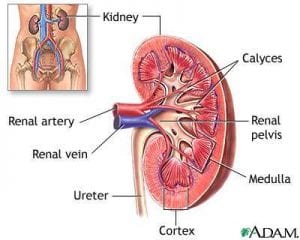 Treating Kidney Disease: One of the medical conditions which diabetics may suffer from in addition to their diabetes is nephropathy, or kidney disease as it is more commonly known. Diabetes can sometimes cause the kidneys to stop functioning correctly and lead to kidney disease and multiple health problems associated with such a disorder. High levels of blood glucose can cause kidneys to filter too much blood and produce a leak in this waste disposal system which is the kidneys main responsibility. If kidney disease is diagnosed early on, the good news is that there are many treatment methods available to help in correcting the problem. However, when kidney disease is diagnosed after a good period of time has passed, the treatment options tend to be fewer in number.
Treating Kidney Disease: One of the medical conditions which diabetics may suffer from in addition to their diabetes is nephropathy, or kidney disease as it is more commonly known. Diabetes can sometimes cause the kidneys to stop functioning correctly and lead to kidney disease and multiple health problems associated with such a disorder. High levels of blood glucose can cause kidneys to filter too much blood and produce a leak in this waste disposal system which is the kidneys main responsibility. If kidney disease is diagnosed early on, the good news is that there are many treatment methods available to help in correcting the problem. However, when kidney disease is diagnosed after a good period of time has passed, the treatment options tend to be fewer in number.
Treatment Options for Those Suffering From Kidney Disease
One of the main ways to treat kidney disease is to keep one’s blood glucose levels and blood pressure at a stable level. For diabetics, keeping the glucose levels stable is a high priority to begin with. Blood pressure should be checked constantly as rises in blood pressure can cause the progression of kidney disease to increase. Keeping your blood pressure down can be accomplished by maintaining a good weight, lowering salt intake, try not to drink or smoke and exercise regularly. All of these things will help keep your blood pressure at a good level and in turn prevent kidney disease from worsening.
Another treatment option for those suffering from kidney disease involves taking certain medications. Medications may include blood pressure medicine and ACE inhibitors. Diabetics may be prescribed ACE inhibitors as opposed to other types of blood pressure medications as it will not interfere with their diabetes treatment. ACE inhibitors often slow kidney disease progression as well as lower one’s blood pressure.
A low-protein diet is another way to treat less serious forms of kidney disease, or kidney disease which is caught early on. Your doctor will often put you on a diet low in proteins which will prevent the kidneys from having to work as hard to keep your body in tiptop shape. In addition, diets which are low in protein will decrease protein loss and increase protein levels. Always consult your doctor before starting this type of diet to ensure that doing so will not adversely affect your diabetes treatment.
If the kidneys have failed, then dialysis will often be necessary. While going through dialysis treatments, it is usually time to contemplate a kidney transplant. Obtaining a kidney transplant is a serious decision and one which should be given much thought. Consult with your doctor first and foremost as well as family, friends and any other medical health professional whose advice will come in handy. Make sure that you know all that a kidney transplant will entail from start to finish prior to making a final decision.
Preventing Kidney Disease
One of the best ways to prevent diabetic kidney disease is to keep your blood glucose levels within the desired target range. Individuals who keep their blood glucose levels at favorable degrees can in fact reduce their chances of getting microalbuminuria, or the first stage of kidney disease, by 1/3. For those who have already been diagnosed with microalbuminuria, keeping track of your blood glucose levels will reduce your chances of getting macroalbuminuria, the later stage of kidney disease, by 1/2. To go even a bit further, there is even a possibility of reversing the occurrence of microalbuminuria via tight blood sugar control. Diabetic individuals have enough to worry about with their current diabetes diagnosis that preventing additional medical conditions from occurring is well worth keeping an even closer eye on the blood sugar levels on a daily basis.